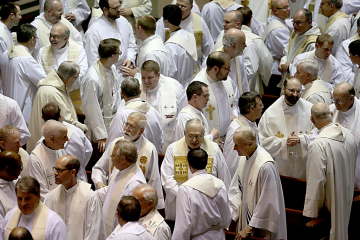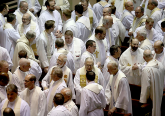Pray the church stays faithful to God, not money, power, pope says
By Carol Glatz
VATICAN CITY (CNS) — Pope Francis condemned a church that worships power, money and “St. Payola,” a fictional patron of lucrative kickbacks.
The temptation is always there to yearn for worldly security and forget that only God can bring peace, true happiness and redemption, he said in his morning homily Nov. 20.
Celebrating an early morning Mass in the chapel of his residence, Pope Francis spoke about the day’s Gospel reading in which Jesus cleanses the temple that, instead of being a house of prayer, had become “a den of thieves” (Lk 19:45-48). By driving out the traders and moneychangers, Jesus angered the temple’s chief priests and scribes, who were benefiting from all the commercial activity.
The leaders of the temple had created a “St. Payola,” the pope said. “They were devoted to money and they venerated this saint.”
“They sullied the temple,” he said. “The temple is an icon of the church. The church will always — always — suffer the temptation of worldliness and the temptation of a power that is not the power that Jesus Christ wants for her.”
When the church does succumb to this temptation and enters into “this process of decay,” he said the end result “is very ugly. Very ugly!”
“In the church, there is always the temptation of corruption,” in which “instead of being devoted to loyalty to the Lord Jesus, the Lord of peace, joy and salvation,” the church becomes loyal to “money and power.”
These chief priests and scribes forgot about God and his spirit, and became “rigid” in order to seem righteous and good, the pope said.
“They had replaced the Lord’s spirit of freedom with rigidity,” which is best explained, he said, in chapter 23 of St. Matthew’s Gospel where Jesus lists all the ways hypocritical religious leaders meticulously try to make things look good on the outside, “but inside they are full of plunder and self-indulgence.”
Such people, the pope said, “had lost the sense of God, also their capacity for joy, the capacity to praise, too: They didn’t know how to praise God.”
In fact, when people become worldly, at most they are capable of “a bit of fun, a bit of noise, but joy comes only from fidelity to the covenant,” he said.
The pope said that the chief priests and scribes of the temple were so angry with Jesus, they wanted to have him killed, but the people were so in awe of his words and teachings, they couldn’t find anyone to carry out their plan.
“The power of Jesus was in his word, his witness, his love. And where Jesus is, there is no room for worldliness, there is no room for corruption.”
“This is the battle inside each one of us, this is the daily battle of the church: always Jesus, always with Jesus, always hanging on his words, to hear his word,” the pope said.
Never seek security in the things of the world, Pope Francis said. “Jesus said that you cannot serve two masters. (It’s) either God or wealth; either God or power.”
The pope also asked that people pray for the church and all the “many martyrs today who, in order to not be part of this worldly spirit, of a single way of thinking and of apostasy, they suffer and die. Today! There are more martyrs in the church today than at its beginning.”
He also asked that people pray for the grace that they themselves never fall into this spiral of “decay toward worldliness that leads us to attachment to money and power.”
– – –
Copyright © 2015 Catholic News Service/U.S. Conference of Catholic Bishops. www.catholicnews.com. All rights reserved. Republishing or redistributing of CNS content, including by framing or similar means without prior permission, is prohibited. You may link to stories on our public site. This copy is for your personal, non-commercial use only. To request permission for republishing or redistributing of CNS content, please contact permissions at [email protected].













